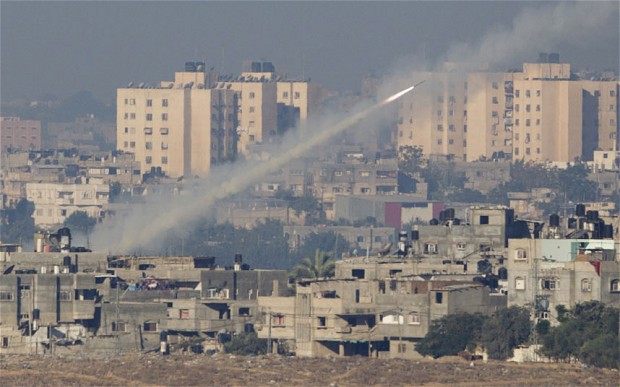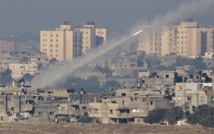UN Secretary-General Ban Ki-moon, on a visit to Tel Aviv, appealed to Israel and the Islamist movement to "stop fighting" and "start talking," but neither side appeared willing to do so.
Israel insisted it would press on with its punishing aerial and ground assault until it destroys cross-border tunnels used by Gaza militants to attack the Jewish state, while Hamas continued to fire rockets and inflicted more casualties on the army.
One rocket crashed just a few kilometres (miles) north of Tel Aviv's Ben Gurion international airport prompting the US Federal Aviation Authority to ban commercial flights to and from Israel for at least 24 hours.
And the European Aviation Safety Agency advised all carriers to avoid Tel Aviv "until further notice".
It was the first time such measures had been taken since the 1990-1991 Gulf war.
Israeli Prime Minister Benjamin Netanyahu appealed to US Secretary of State John Kerry to get the FAA ban rescinded.
"Netanyahu spoke this evening with ... Kerry and asked him to act to restore flights by American airline companies to Israel," sources in Netanyahu's office told AFP.
Kerry said the order would be reviewed within in a day and told Netanyahu the ban was solely due to safety concerns, State Department spokeswoman Jen Psaki said.
Following top-level talks in Cairo, Ban went to Israel to deliver his views in person as the 15-day conflict showed no sign of easing.
"My message to Israelis and Palestinians is the same: Stop fighting, start talking and take on the root causes of the conflict so that we are not at the same situation in the next six months or a year," he said.
In Cairo, Kerry discussed ceasefire proposals with Egypt's President Abdel Fattah al-Sisi, with both voicing guarded hopes of an end to the violence.
And a senior Palestinian official said talks were ongoing between president Mahmud Abbas and Hamas for a ceasefire.
Abbas pledged that Israel would be held accountable internationally for Gaza deaths.
"We will pursue all those who commit crimes against our people, however long it takes," he said in televised comments ahead of an emergency meeting of the Palestinian leadership in Ramallah.
The meeting's concluding statement called for "widespread popular protest in solidarity with Gaza and the resistance."
Israel initially refused to halt its fire without finishing a ground operation to destroy tunnels used by Hamas for attacks inside Israeli territory, and Hamas has rejected ceasefire proposals presented by Egypt, saying its own demands must first be met.
- UN school bombed -
Despite the flurry of diplomatic activity, the death toll on the ground in Gaza stood at 631 Palestinians, medics said.
Tension also remained high in the West Bank where Israeli forces shot dead a Palestinian man early Wednesday, Palestinian security sources told AFP
Israel pummelled targets throughout the besieged Gaza Strip, hitting a UN school sheltering the displaced, said the United Nations' Palestinian refugee agency, UNRWA.
At the time a team from the agency, with Israeli clearance, was at the school observing damage from a possible strike the day before.
"While they were there, they came under Israeli shelling," an official said, adding there were holes blown through the walls of the school compound, but that no-one was hurt.
Since the offensive, more than 100,000 Gazans have fled their homes, seeking shelter in 69 schools run by UNRWA.
The Israeli military said two more of its soldiers had been killed in the fighting a day earlier, hiking its overall death toll to 29, among them 27 soldiers who died in the past four days.
It also confirmed the death of a soldier who Hamas militants claimed they had kidnapped, saying his body remained unaccounted for, which suggested Hamas was likely holding the soldier's remains.
Despite its rising body count, Israel said it would only halt its Gaza offensive after laying waste to a sophisticated network of tunnels used by militants for cross-border attacks.
A ceasefire "won't happen before we really finish the tunnels project which was laid out as a strategic objective," Justice Minister Tzipi Livni said, referring to a ground offensive launched on Thursday evening.
She said Hamas's "completely unacceptable" preconditions for a truce had "no chance of being accepted by anyone".
Hamas has laid out a list of demands for halting its fire, including a lifting of Israel's eight-year blockade on Gaza, the release of dozens of prisoners, and the opening of its Rafah border crossing with Egypt.
- 'Stop fighting' -
As he touched down in Tel Aviv, the UN's Ban demanded the two sides immediately hold their fire.
Describing Hamas rocket fire on Israel as "shocking," he said it must "stop immediately".
But he also said Israel must exercise "maximum restraint" in Gaza, and he urged it to take a hard look at some of the root causes of the conflict "so people will not feel they have to resort to violence as a means of expressing their grievances".
In Cairo, following talks with Sisi, Kerry again placed the onus on Hamas to accept a ceasefire to end the raging conflict in Gaza, voicing support for an Egyptian truce initiative as a "framework" to end the fighting.
The European Union appealed to Israel to keep its military operation in Gaza "proportionate" and for "all sides to implement in good faith an immediate ceasefire," a statement from a meeting of European foreign ministers in Brussels said.
It added that "All terrorist groups in Gaza must disarm," a comment welcomed by Israel.
-------------------------------------------------------------------------------------------------------
Israel insisted it would press on with its punishing aerial and ground assault until it destroys cross-border tunnels used by Gaza militants to attack the Jewish state, while Hamas continued to fire rockets and inflicted more casualties on the army.
One rocket crashed just a few kilometres (miles) north of Tel Aviv's Ben Gurion international airport prompting the US Federal Aviation Authority to ban commercial flights to and from Israel for at least 24 hours.
And the European Aviation Safety Agency advised all carriers to avoid Tel Aviv "until further notice".
It was the first time such measures had been taken since the 1990-1991 Gulf war.
Israeli Prime Minister Benjamin Netanyahu appealed to US Secretary of State John Kerry to get the FAA ban rescinded.
"Netanyahu spoke this evening with ... Kerry and asked him to act to restore flights by American airline companies to Israel," sources in Netanyahu's office told AFP.
Kerry said the order would be reviewed within in a day and told Netanyahu the ban was solely due to safety concerns, State Department spokeswoman Jen Psaki said.
Following top-level talks in Cairo, Ban went to Israel to deliver his views in person as the 15-day conflict showed no sign of easing.
"My message to Israelis and Palestinians is the same: Stop fighting, start talking and take on the root causes of the conflict so that we are not at the same situation in the next six months or a year," he said.
In Cairo, Kerry discussed ceasefire proposals with Egypt's President Abdel Fattah al-Sisi, with both voicing guarded hopes of an end to the violence.
And a senior Palestinian official said talks were ongoing between president Mahmud Abbas and Hamas for a ceasefire.
Abbas pledged that Israel would be held accountable internationally for Gaza deaths.
"We will pursue all those who commit crimes against our people, however long it takes," he said in televised comments ahead of an emergency meeting of the Palestinian leadership in Ramallah.
The meeting's concluding statement called for "widespread popular protest in solidarity with Gaza and the resistance."
Israel initially refused to halt its fire without finishing a ground operation to destroy tunnels used by Hamas for attacks inside Israeli territory, and Hamas has rejected ceasefire proposals presented by Egypt, saying its own demands must first be met.
- UN school bombed -
Despite the flurry of diplomatic activity, the death toll on the ground in Gaza stood at 631 Palestinians, medics said.
Tension also remained high in the West Bank where Israeli forces shot dead a Palestinian man early Wednesday, Palestinian security sources told AFP
Israel pummelled targets throughout the besieged Gaza Strip, hitting a UN school sheltering the displaced, said the United Nations' Palestinian refugee agency, UNRWA.
At the time a team from the agency, with Israeli clearance, was at the school observing damage from a possible strike the day before.
"While they were there, they came under Israeli shelling," an official said, adding there were holes blown through the walls of the school compound, but that no-one was hurt.
Since the offensive, more than 100,000 Gazans have fled their homes, seeking shelter in 69 schools run by UNRWA.
The Israeli military said two more of its soldiers had been killed in the fighting a day earlier, hiking its overall death toll to 29, among them 27 soldiers who died in the past four days.
It also confirmed the death of a soldier who Hamas militants claimed they had kidnapped, saying his body remained unaccounted for, which suggested Hamas was likely holding the soldier's remains.
Despite its rising body count, Israel said it would only halt its Gaza offensive after laying waste to a sophisticated network of tunnels used by militants for cross-border attacks.
A ceasefire "won't happen before we really finish the tunnels project which was laid out as a strategic objective," Justice Minister Tzipi Livni said, referring to a ground offensive launched on Thursday evening.
She said Hamas's "completely unacceptable" preconditions for a truce had "no chance of being accepted by anyone".
Hamas has laid out a list of demands for halting its fire, including a lifting of Israel's eight-year blockade on Gaza, the release of dozens of prisoners, and the opening of its Rafah border crossing with Egypt.
- 'Stop fighting' -
As he touched down in Tel Aviv, the UN's Ban demanded the two sides immediately hold their fire.
Describing Hamas rocket fire on Israel as "shocking," he said it must "stop immediately".
But he also said Israel must exercise "maximum restraint" in Gaza, and he urged it to take a hard look at some of the root causes of the conflict "so people will not feel they have to resort to violence as a means of expressing their grievances".
In Cairo, following talks with Sisi, Kerry again placed the onus on Hamas to accept a ceasefire to end the raging conflict in Gaza, voicing support for an Egyptian truce initiative as a "framework" to end the fighting.
The European Union appealed to Israel to keep its military operation in Gaza "proportionate" and for "all sides to implement in good faith an immediate ceasefire," a statement from a meeting of European foreign ministers in Brussels said.
It added that "All terrorist groups in Gaza must disarm," a comment welcomed by Israel.
-------------------------------------------------------------------------------------------------------









 Home
Home Politics
Politics











